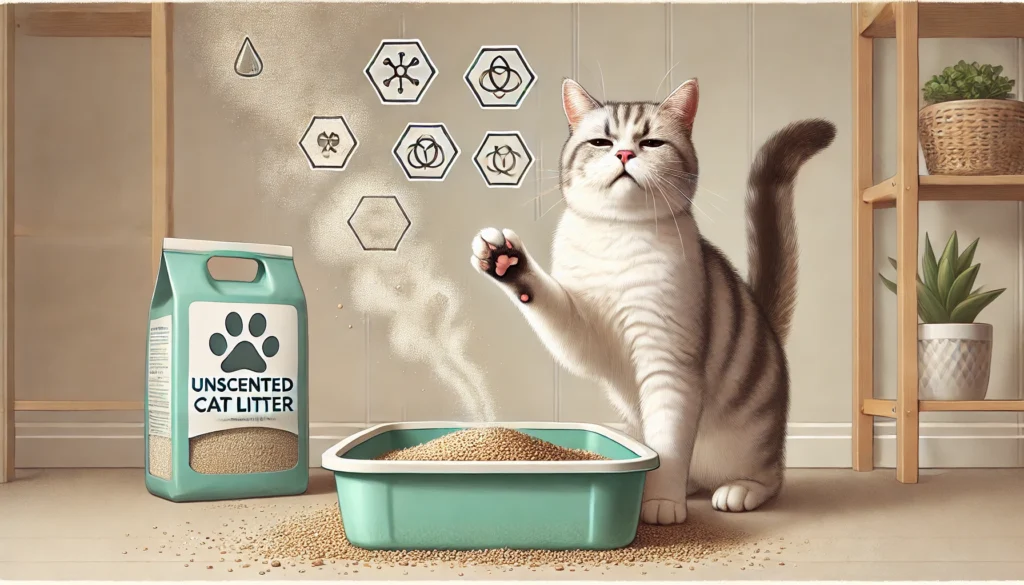HealthXWire is cautioning cat owners about the potential hazards of using scented litter. While scented products may help to control litter box odor, they pose potential risks to cat health that may outweigh their benefits.
For many cat owners, one of the most unpleasant aspects of keeping felines is the litter box odor. While scented cat litters promise to eliminate this all-too-common problem, mounting scientific evidence indicates that they may pose serious health risks to cats. According to experts in animal care and veterinary medicine, significant feline health hazards caused by scented litters may include respiratory problems, allergic reactions, and behavioral issues. The additives and fragrances used in these products are often the primary culprits behind these adverse effects.
Accordingly, veterinarians and experts in feline care now widely recommend unscented, low-dust, and natural cat litters to ensure the safety and well-being of cats. Dr. Elsey’s, a leading supplier of cat products, supports the feline care community in raising awareness among its customers about these issues. The company offers a variety of veterinarian-formulated cat litters produced to meet the needs of cats at different stages of life and health.
The global cat litter products market size was estimated at USD 15.65 billion in 2023 and is expected to grow at a compound annual growth rate (CAGR) of 5.2% from 2024 to 2030. It is anticipated that the market for cat litter will grow because of an overall increase in the cat population and the rise in the number of households that have more than one cat.
Scented cat litter has gained popularity due to the overall increase in demand for scented consumer products; however, there is also a growing preference among conscientious consumers for cat litter that is free from chemicals or fragrances.
As a result, companies are investing in research and development (R&D) to introduce new natural products that are both safe and efficient. Rising initiatives by companies in this space are expected to have a positive impact on the market.

Scented cat litters: health risks and recommendations
The American Veterinary Medical Association (AVMA) has issued an advisory against the use of scented cat litter, citing concerns that the artificial fragrances and chemicals in the litter can irritate cats’ respiratory systems, skin, and overall well-being. To minimize health risks, the AVMA recommends using unscented, low-dust litters.
Real-world cases have provided evidence that scented cat litter can cause acute and chronic health issues in cats. Reports submitted to the Pet Poison Helpline have documented instances where cats exposed to scented litter exhibited symptoms such as coughing, sneezing, skin irritation, and in severe cases, difficulty breathing.
In addition, experts at Cornell University College of Veterinary Medicine have found that many scented cat litters contain artificial fragrances and volatile organic compounds (VOCs) that can be toxic when inhaled or ingested by cats over prolonged periods. The College’s Feline Health Center reports that most cats prefer non-scented litter because what may seem like a light perfume to a person can be stressful and overwhelming to a cat.
Research published in the Journal of Feline Medicine and Surgery has found that certain scented litters can trigger allergic reactions and respiratory issues in cats, such as asthma-like symptoms and sneezing. These health problems are particularly concerning for cats with pre-existing respiratory conditions or sensitivities to chemicals.
To keep cats safe and healthy, owners are advised to:
- Choose unscented litters that do not contain any artificial fragrances or dyes.
- Select low-dust options since dust can exacerbate respiratory issues.
- Consider choosing natural materials.
- Monitor your cat’s health and consult a veterinarian promptly if you notice any adverse symptoms after switching litters.
By making informed choices about litter, cat owners can significantly contribute to their pets’ health and comfort.
About HealthXWire is a digital publication serving an audience located primarily in the United States.



